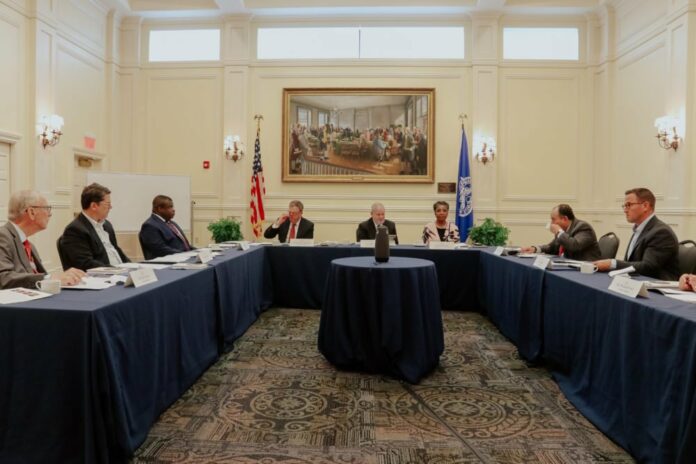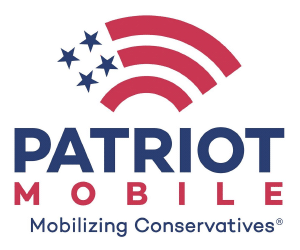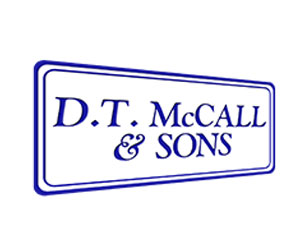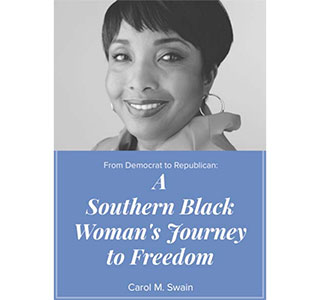TRANSCRIPT:
Matthew Spalding:
Hello, this is Matthew Spalding. I’m the executive director of The 1776 Commission. I’m also vice president of Hillsdale College back at our Washington, D.C., campus. I’m joined today by Dr. Larry Arnn, who is the chairman of The 1776 Commission and also the president of Hillsdale College, and Dr. Carol Swain, who is a former professor of political science at Princeton and Vanderbilt universities, who is the vice-chair. Thank you both for being with me. As all of you know, The 1776 Commission issued The 1776 Report on January 18, 2021. And two days later, that report and the commission were abolished by executive order on January 20, 2021.
Matthew Spalding:
Despite that, The 1776 Commission has just met in Washington, D.C., at the Hillsdale College Washington, D.C., campus. We’ve had a great meeting, and we will be issuing a statement about that. But the chairman and the vice chair are here to give us some of their sense of the meeting and some reactions so that we can get the message out to continue this great work of recovering the principles of the American founding and taking in the advice, but also the potential threats, that were issued by The 1776 Commission Report. With that, Dr. Arnn, would you like to give us some opening thoughts or comments about how the meeting went?
Larry P. Arnn:
I agree it was a great meeting. The commissioners are all people appointed because they have a lifelong interest in the meaning of the United States of America. We are very keen to see that we mark the 250th anniversary of the Declaration of Independence in 2026 nobly, and in a way to revive understanding of it. Of course, that is in great disrepute today among most of the intellectual classes. And we think that is mistaken. It is a disastrous mistake. So we talked today, and we accepted appointment to this commission because it’s something we… It’s unthinkable that I or Carol would be asked, or you would be asked, by Joe Biden to serve on such a commission. But if he asks, we would, and that’s because it’s what we do.
Larry P. Arnn:
The commissioners are all people like that. And so we took an oath, as a condition of service on the commission, to uphold the Constitution of the United States, terribly like the one that the military people and the president take; so we’ve sworn we’d do that. And it’s a free country. There’s no law that we can’t carry on and meet and talk… You can buy the commission’s issued report. We regard it as a beautiful report. You can get the report from Encounter Books. And it’s worth reading for a lot…not about a controversy. There is controversy here. It’s worth reading about what is the meaning of the country. And it’s tremendous, so I invite you to see it.
Matthew Spalding:
And then the report, the original report is available on many websites, including Hillsdale’s and others. But the Encounter Books report that Dr. Arnn refers to has footnotes and some other commentary that we added with it. One of the criticisms was the report included no references. So we put references in it, including to a lot of mainstream historians who make the same argument as we do. So it’s full of all sorts of citations to the work we’ve been doing.
Larry P. Arnn:
Also, Joe Biden is footnoted.
Matthew Spalding:
The President is footnoted, which we thought was appropriate. So, the first lesson here was the commission continues, and it will continue, and we take that seriously because there’s a lot of work to be done. Right, Carol?
Carol Swain:
Absolutely. And I’m so excited that we met at this point in time. When I agreed to serve on the commission, it was in December when I gave my yes. And at that time, the election, we had preliminary results. It did not look good for President Trump, but I agreed to serve because I thought the mission was so important. And in my heart, I hoped and believed that President Biden, if he were to remain the President Elect or be elected President—at that time, the election was contested—that he would keep the commission alive because it lends itself to such a bipartisan effort. It was about our nation, our founding, about educating our young people. Who could be against that? I was disappointed in President Biden when he, on the very first day of office, with the stroke of a pen, sought to eliminate the commission and its work.
Carol Swain:
But when you’re dealing with truth and ideals, it takes more than that to eliminate the spirit of people who love America, who care about its future. This meeting today is taking place at a time when Americans across the country are awakening to critical theory, critical race theory, critical gender theory. They’re seeing what’s happening in the schools, the military, their workplaces, and how there’s a divisive agenda to divide Americans and to teach our children to be anti-American. And what came out of today’s meeting is that the people who convened, we see what’s happening in America, and there are people who are reaching out to us, and they need hope, they need direction, they need inspiration. So I can’t think of a better time for us to reconvene. I am excited about what lies ahead. It may look dismal out there right now, but there is hope in the American people, and there is hope in what we are doing, and it is not over yet.
Matthew Spalding:
As the three of us said in our initial statement when this commission was being abolished, as it was literally happening, you can abolish a commission, you can take a report down from a website, but you cannot erase our history.
Carol Swain:
And who we are. We’re fighters.
Matthew Spalding:
And who we are, and this will continue. And it has continued. Just last week, we issued a statement to the Department of Education, commenting on their regulation, which is to direct federal funding towards essentially critical race theory and such studies on behalf of the federal government. We talked a lot in the meeting, Dr. Arnn, about curriculum and various curriculum projects, including one by Hillsdale College.
Larry P. Arnn:
Hillsdale College has a lot of involvement in the charter school world. We’ve sponsored 25 charter schools, and there are soon to be 11 more—might be many more than that. And we have curricula, and we’re teachers for living, so we have an idea about how to set up a school and make it successful. And civics is a big thing to teach. Make no mistake. We are not contesting critical race theory and the New York Times 1619 Project. We don’t like their model. We have a different model. We think that the stuff in the past happened, and you can find out what it is, and you must never tell the story of America without telling the story of slavery, a blemish on America—not the only one, by the way—but also you have to tell the story of the mighty efforts that were made, and right from the beginning in the Declaration of Independence, to undercut the ground of slavery. You have to tell the whole story.
Larry P. Arnn:
If you tell the kids what we’re telling them today, here’s what they learned. They learned, this is a very evil past, and we’re past all that now. Now we’re in a better shape. But the truth is, every age has got its blind spots and its injustices. We have them in our age now. Just think for a minute. Did we not just wipe out millions of businesses with pandemic policies? Maybe they were necessary, maybe not, but that was a big thing. So we want to tell the whole story. And that’s what history is. That’s how you should teach it to the young.
Larry P. Arnn:
Then they can figure out, by the way, Thomas Jefferson was personally deeply troubled about slavery and did take massive steps against it, including especially engineering the Northwest Ordinance, which forbids slavery in the first five states added to the Union. But he was a slave holder, and he didn’t liberate his slaves, even when he died. What should a young person conclude from that? Conclude that no life is perfect, even great lives have imperfections, and that should give them an additional motive to cultivate their own imperfection.
Carol Swain:
It’s important that we tell the whole story. And the whole story is that the first Blacks that came to America served along with whites as indentured servants, and they were freed, and they became the basis of the free Black population in America. Some of the most prosperous Blacks in our nation are descendants of free Blacks. There were Black slave holders, there were Native American, as well as white. The other part of the story is that there were always whites who were abolitionists, who fought against slavery. And if you look at the aftermath of slavery, you have stories, such as Booker T. Washington’s up from slavery and the fact that he set up the Tuskegee Institute. The Tuskegee Institute was funded by white philanthropists as well as the Rosenwald Schools, 5,000 schools set up across the South to educate the newly freed slaves. The historically Black colleges and universities, they were funded by white philanthropy. And those parts of the country where they did not practice discrimination always had Black alumni.
Carol Swain:
New England, for example, you go back to many of those colleges, and they have black alumni going back to the 1800s. The history of America is far more complicated than anything that we are hearing right now. The best education we could give our young people is to have them read the original documents, read the autobiographies, and really study all sides of it. The Civil Rights movement…it happened because whites and Blacks and others work together; people worked across religious lines. The story of America is a history of overcoming, a story of hope and optimism. That side needs to be told too.
Carol Swain:
It is very destructive to focus on just one part of the nation’s history and to argue that racism is permanent and that Blacks are victims. There is a civil rights movement that I watched as a child, and I’ve benefited from that. There are people who were overcomers because of the passage of the civil rights laws of the 1960s. They created opportunities for people like me. That side of the story needs to be told. And I believe that in telling the full story of America, you will provide optimism for many minorities who hear this negative narrative about how oppressed they are and how racism is so permanent and it doesn’t matter what they do. That is a life-sapping message that is not consistent with who we are as a people and our nation’s rich history.
Matthew Spalding:
One of the things that concerns me that we talked about quite a bit is how rapidly a lot of this is occurring, at the federal level, the state level; it just seems to be everywhere you turn. We want to restore a true history, an accurate history, look at history warts and all, but there’s an aspect in which we need to be wary of things that are being imposed very quickly. There’s federal legislation. There’s a lot of activity at the state level. But really, we need to get this back down to the level of the school and school boards and parents, especially, in the effort to recover the education of their children. That seems to be a broader thematic, and a broader fight that’s going on here is, who is in control of education, and how do we restore their authority so that we can teach that true history?
Larry P. Arnn:
In America, we have natural rights. It’s good to think about the word nature. It comes from the Latin word for birth. It means the process of beginning and growth by which a living being comes to be. Human children take a long time to raise, and they are very dependent for a long time. They have a natural claim upon their parents for care, but that natural claim also gives their parents a natural authority over them when they’re minors. Just remember, we’re the only being that has a choice whether to have children or not, and yet our children are a lot of trouble to us. And if we don’t take the trouble, the children don’t grow up well. Early schooling, when the kids are still minors, before they’re 18 years old, that means all the way through high school, that means that the parents are legally and ultimately responsible for the child.
Larry P. Arnn:
The right way to set up education is… The natural sovereign, I like to say, of education is the school, because that’s when the parents and the teachers who know the children are gathered with the children to effect education. And that’s the model that prevailed in K through 12 education in America until the 20th century. But now what do we have? We have more than half the employees at the public schools who are not school teachers. A lot of that majority spend their time writing rules about what should be done in the classroom, but they don’t even go in those classrooms, and they never meet the children or the parents. Schools should be controlled close to the families and teachers of the children.
Carol Swain:
That was one of the themes that came out of our meeting today. We talked about how important it is for parents and Americans who care about education to get involved at the local level. We were encouraging people to organize, run for the school board, and to become involved with the educational process of what their children were being taught. Starting at the local level is essential. We need to resist federal efforts to nationalize educational curriculum, such as what is being proposed through this federal rule that the Biden Administration has put out.
Matthew Spalding:
I think that the effort to get it back down to those levels is crucially important, because it seems to me that the problem with a lot of these national efforts, especially now with federal legislation, and in a lot of states and state curriculums, is they’re being overwhelmed by these radical ideologies that are very quickly trying to undermine the good curriculums that are out there. I think too many parents and others are not doing what is necessary to reclaim the power they have. State legislatures have immense amounts of power; indeed, the constitutional responsibility over the curriculum taught in their states.
Matthew Spalding:
There are many that are reforming their curriculum. There are some, including Texas, which is looking to be a great model for other states, that are not only doing good work on their curriculum, but also actively pushing back against things like critical race theory, which is essentially teaching a racist pedagogy, but also this thing now called Action Civics, which is essentially treating civics not as a subject to be taught with content, but to essentially be a form of activism. There is something that needs to be pushed back against, simultaneously replacing it with a better alternative.
Carol Swain:
Yes. And with the Action Civics, it really involves pushing a particular progressive worldview. And it’s been going on for a while, because there were reports a few years ago of teachers without parental consent taken their students to protest rallies, maybe Black Lives Matter or whatever the current protest was. The teachers were involving their students at that level and offering extra credit if they participated. These are things that are certainly inappropriate. It takes the place of academic learning. There are some other things we ought to be concerned about when it comes to educational equity and some of the training that teachers are receiving, videos that are being shown to children; they really run up against the civil rights laws, in my opinion, because it does single out the white race in a way that many white children find themselves shamed. There can be elements of bullying involved and inappropriate material shown to children that’s very disturbing.
Carol Swain:
That needs to be closely monitored. It’s certainly inappropriate, and it’s happening in the K through 12 educational realm, and not just at public schools but also at some private schools and Christian schools. This is all part of an agenda that should not be taking place in our classrooms. It is a worldview that’s being taught. And it takes the place of solid academics that young people should be learning. Parents have to be aware that something is taking place; and they are mobilizing. Parents are mobilizing. They are becoming aware of what their children are being taught.
Carol Swain:
This is a moment where I think that we are seeing a civil rights issue being played out. It’s not the traditional civil rights issue where you had minorities oppressed racially, you had Blacks and Hispanics that had civil rights claims. At this moment, I believe a lot of white Americans have civil rights claims because they’re being demonized and singled out in a way that’s totally inconsistent with American principles, and also even the Equal Protection Clause of the Constitution. In America, we don’t single out people and demonize them because of the color of their skin or something their ancestors may have done.
Matthew Spalding:
The report talks about this when it talks about the history of the pro-slavery argument, an argument made by someone like John C. Calhoun. The introduction of distinguishing people by group identity, especially racial identity, is almost always a dangerous thing. But Carol, something you said, and I was going to ask both of you about this. I think one thing that is important, which we discussed some, is for people to realize that the problems which we’re describing go by various names. Indeed, the language keeps changing. Identity politics, critical race theory, critical theories, equity. And then with civics, there used to be something called service learning. Then there was Action Civics, the new civics. It is important not to get confused by the technical language that seems to be being used today or tomorrow, but to see through all that and understand the principles, the larger thing that’s going on here, which is an ideological replacement of our own history with something else, with an intended political outcome. And that seems to be the very… We need to be able to see through and see what’s really going on here.
Carol Swain:
Well, one of the things that you see, they talk about educational equity. They’re not equal opportunity, where you remove barriers and you try to create an environment where everyone can compete to be the best. When they talk about racism, it doesn’t mean what racism used to mean. According to that definition, all white people are racist, and they are expected to acknowledge that and to become actively anti-racist by challenging racism. This model that’s being put forth and pushed by our government, we’re no longer seeking a colorblind society. They want us to be color conscious. They want to teach young children how to group and categorize their classmates by race. That is so anti-American.
Matthew Spalding:
Right. Including themselves. You have to understand that you are part of a category that is inherently racist perhaps.
Larry P. Arnn:
Young people grow up at a certain rate. At the College, we have 18- to 21-year-olds. And they’ve gotten to the age where they can do anything we can do. They just never have before. So they still need time to mature. Now, this activism as a curriculum, what that does is take a bunch of kids who haven’t had time to learn and put them to work in controversial efforts. That means that you deprive them of their time to learn. It’s a kind of child abuse. And it’s going on. If you want to see that taken to extreme, and it will be here if it keeps going, read the novel 1984, where every kid has to go to school, and they’re incorporated into a club called The Spies. And what they do is spy on their parents and denounce their parents and other adults, who are arrested and tortured. The point is, why don’t you spend your time? Slavery is a big question. Study it, find out about it. “No, go protest about it” is not a good way to learn.
Carol Swain:
Dr. Arnn, some years ago, some of this stuff has been going on for a while, but I can remember a colleague at the university, and I won’t say which one of the two universities, but he wrote an opinion piece. And he told the students to go home for Thanksgiving and challenge your parents and your grandparents when they make their racist statements. He was actually encouraging them to go home for this holiday and to spy on their parents and to challenge their parents. I think that that was at the college level. Now they’re doing it at K through 12. They’re turning the children against the parents and grandparents.
Matthew Spalding:
As we wrap up our time here, I want to ask you both about a general thing, which is…and Carol, you already mentioned this by noting that there are a lot of parents mobilizing. There are people deeply concerned about this. When it was announced that the commission was going to meet again, I can’t tell you how many emails and texts I got from friends I hadn’t heard from in a long time. The press was asking questions about, “Why are you meeting? How can you meet? You were abolished.” It strikes me that there is a lot going on in this country. There are a lot of negative things we’re watching. There are a lot of positive things going on. There are people wanting to get involved and do more things. And when the media would ask me about it, “Are you guys coordinating all this?”
Matthew Spalding:
I think the answer is no, we’re not. We’re a commission. We’re going to continue to exist. We’re going to say things. We’re going to be involved in, all of us, in our own work. We’ll continue to be involved in our work. But we want to encourage and commend the American people to get more involved, in the spirit of citizen participation to get involved in school boards, as you said earlier, and do all the things; as parents, get more involved in education; as local communities, trying to influence the writing of a curriculum; as state legislatures. That strikes me as an extremely American thing on the order of American history. And the role that I think the commission can play is like a committee of correspondents during the American revolution, encouraging that, because there is a movement out there. It is not us. It is a movement in America, and we just want to encourage it.
Carol Swain:
I can tell you that in 2011, I published a book, Be the People: A Call to Reclaim America’s Faith and Promise. Then last fall, after the election, I wrote a new introduction for that book. It was all about encouraging the We the People in the Preamble of the Constitution to stand up and take responsibility for the nation that they have. Because when we don’t like what policymakers are doing and what people are doing around us, it’s our government. We put our leaders there. They enact those policies and programs supposedly on our behalf. We have a mechanism to change it. What we are witnessing right now is the people, the We the People awakening and becoming involved, and that was how the Constitution was supposed to work. That is how our nation is supposed to work. We certainly applaud it, we encourage it, and we need more people to stand up and make their voices heard. It’s We the People. The power rests in our hands.
Matthew Spalding:
Dr. Arnn, last thoughts?
Larry P. Arnn:
Our activist agenda is simple to understand: teach and learn. They’re very fundamental arguments, and they’re sweeping the country, and they have enormous political force behind them. But political force by itself can never establish a truth. What people need to do is think about what’s going on and read up on it; read the past, and know the history of the country, and teach it to their children.
Matthew Spalding:
Great. I thank you both for your time. The 1776 Commission will continue. It will continue its work, because there is much work to be done and because these abiding principles in this great history that is America cannot be erased as much as they try. It will continue because of these great Americans on this commission and all those others around the country who are working so hard to recover the principles of the American founding and this country. Thank you both.
Speaker 4:
For additional information on the 1776 Commission and to download the 1776 Report, go to hillsdaleforliberty.com/1776report. That’s hillsdaleforliberty.com/1776report.







